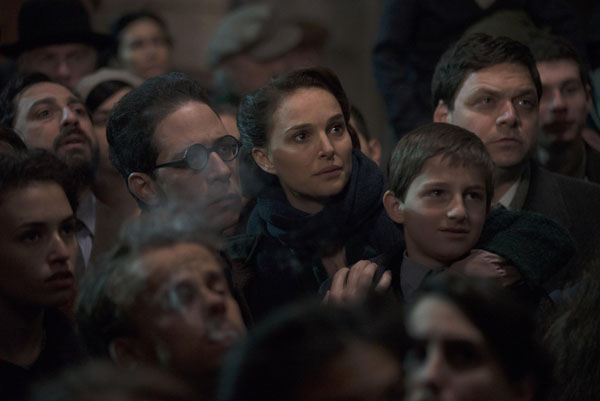We begin with Tim Grierson, freshly appointed senior US critic for Screen International: “A minor-key drama about a mother whose poetic soul has a profound effect on her son, A Tale of Love and Darkness is very much like its matriarch: lovely, mysterious but also a bit insular and ephemeral. First-time feature director Natalie Portman has taken on a considerable challenge with this adaptation of Amos Oz’s memoir of his upbringing in Israel and the sad decline of his mother, and she’s not wholly successful in the endeavor. Indeed, an overly self-conscious somberness infuses the film, keeping this heartrending tale from being as poignant as it could be.”
“It’s perfectly obvious why Oz felt compelled to honor his mother Fania’s memory in print,” grants Variety‘s Peter Debruge, “but not necessarily as clear to understand why Natalie Portman felt so fiercely drawn to the character—to the degree that she spent years developing Oz’s melancholy memoir to be her feature writing-director debut, appearing as the beatific Fania herself. Most likely, it was simply a case of her being touched by Oz’s work and wanting to share that emotional experience with others, though her drearily empathetic film lacks whatever universality has made Tale such an international phenomenon.”
The Guardian‘s Andrew Pulver: “Portman, who was born in Israel and who lived there until she was three, before her family moved to the US, has taken a brave decision to take on such potentially contentious material—and while the resulting film is perhaps a tad on the conventional-looking side, it has an unusual, and possibly unique, perspective on Israeli psychology, and Portman demonstrates she possesses a confident grasp of film-making fundamentals.”
“Oz was born in Jerusalem in 1939 under the British Mandate, and grew up in the country’s turbulent early years,” notes Deborah Young in the Hollywood Reporter. “The action takes place on the cusp between British rule and the birth of the nation in 1947. Aided by a bit of newsreel footage, the mood of poverty, fear and insecurity is sketched in the stripped-down set design and Slawomir Idziak’s stylish but grimly dark cinematography.”
“The film concerns itself with the ways in which history can variously build and break the human spirit,” writes the Telegraph‘s Robbie Collin. “Young Amos (Amir Tessler) spends his formative years in a state of flux in at least two senses, foraging for food and metal by day and feeling explosions rattle his bedroom window-panes at night…. The drama plays out in a spirit of desaturated seriousness, narrated by the venerable Israeli Arab actor Makram Khoury, whom we occasionally see walking the streets of present-day Jerusalem as the middle-aged Amos, looking through darkened windows and glimpsing moments from his past…. The film feels like a personal project for Portman, but thankfully never a vanity one.”
Indiewire‘s Eric Kohn finds that “Portman’s screenplay shortchanges the dramatic potential of the material in favor of a by-the-numbers period piece. Though Oz’s ruminations on Israel’s evolving statehood certainly sit at the forefront of the material in compelling fashion, Love and Darkness doesn’t do much to make them stand out.”
For Deadline, Ali Jaafar talks with Portman, who “arrives on the Croisette attached to a slew of new projects, all announced within days of each other: Mareille Heller’s Ruth Bader Ginsburg biopic On the Basis of Sex; Pablo Larraín’s Jacqueline Kennedy biopic Jackie; Rebecca Zlotowski’s Planetarium and Alex Garland’s Annihilation.”
Update, 5/19: “The film’s bravest act might be in holding on to Oz’s controversial certitude that what some Israeli Jews have done to Palestinians echoes what neo-Nazis do in Europe,” writes Wesley Morris at Grantland. “But by the time that point is made, droning uniformity has induced intellectual paralysis. Dissenters might be too bored to object.”
Cannes 2015 Index. For news and tips throughout the day every day, follow @KeyframeDaily. Get Keyframe Daily in your inbox by signing in at fandor.com/daily.




